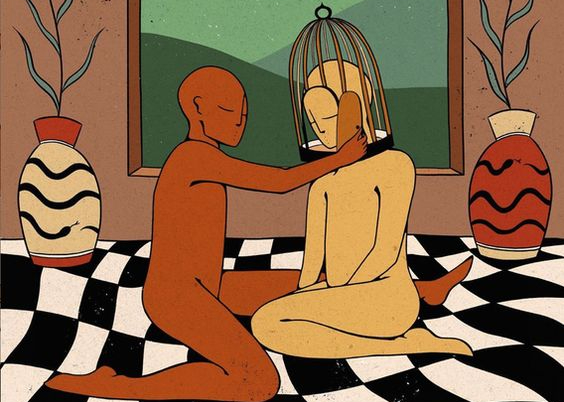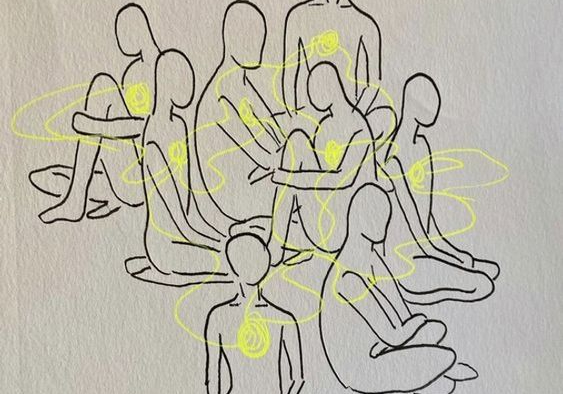NPD lover’s "three -stage routine", "first passion and then indifferent" must be careful
Author:Knowing my psychology Time:2022.08.18
Recently, the concept of NPD has been mentioned by many fans. I received a lot of questions in the background: "My other half seems to be NPD, what should I do?"
NPD (Narcissistic Personality Disorder) original meaning is a narcissistic personality disorder and a mental disorder that can be diagnosed. But we understand that the NPD that most friends are asking now may not fully meet the diagnostic standards of narcissistic personality disorder. TAs will show the characteristics of narcissism in intimate relationships. There is a certain law of love, which will cause psychological trauma to the other half, but may not satisfy the diagnosis of the disease -TAs are actually "narcissism -type applies in intimacy. Abuse. In order to make a simple text and convenient for fans and friends to read and understand, we still refer to the TAs as NPDs.
Intersection Intersection Remind seriously, do not diagnose yourself! Intersection

What is the "narcissistic abuser" in the relationship?
(The following is referred to as NPDs)
Many narcissistic abusers in intimate relationships are very normal in daily life and work, and they have the ability to enjoy others. But in front of the closest half, the dark side of the TA's personality will be exposed. The performance of "narcissistic abusers" is to apply various inequality, use and manipulation to the other half in intimacy (Cononville, 2012).
Let's take a look at what TAs look like in intimate relationships:
Unable to continue to enjoy the sweetness of love in intimacy. After a period of time, I will start to feel that the personality, appearance, living habits, and even some moves of the other half will make TA feel unbearable; after determining the relationship, the TA will become an absolute "master" in this relationship. Grasp the progress of love, the habit of getting along with each other, even lifestyle, and so on; enjoy the other half of the love or worship of the other half of the love, so that they often degrade, suppress, mockery, satirize the other half of the other half; It is often furious by the other half, and will send anger to the other half. The reason for being furious may be diverse: what you say that TA doesn't like it, you don't put TA's most important position, you don't meet the requirements of TA (no matter what the reason), you don't spend more energy or more energy or more energy or more energy or more energy or more energy Time to accompany TA and so on; good at control. For example, "Taking a slap to three jujube" tuning you; creating a "third party" to increase your tension, etc.; TA's past emotional experience is "not good".
TAs are proficient in manipulation. TAs will do what they do wrong and find an angle on you, so that you believe it is your own responsibility; or irony and attacking your self -esteem; TAs are good at creating guilt traps and let you change yourself for TA because of guilt. Essence
In addition, the TAs will continue to tell you that your feelings are unreasonable, irrational, and too sensitive through "Invality) to the public account and extract the confirmation technology. Sometimes you will tell more directly that your feelings are not important.
When TA's narcissism is threatened or denied, anger broke out.
A health relationship should have 7 characteristics of "mutual benefit, sincerity, equality, respect, independent, moderate dependence, and common progress" (BORNSSTEIN, 2010). In love with NPDs, it does not exist. The TAs only care about their own interests; they will lie to the other party; they will always feel high; they will not respect each other; they may overly depend on each other in the early stage, and they will be too indifferent to the late stage; and squeeze the emotions and energy of the other party.
It is difficult for NPD to get satisfaction in intimacy. Studies have shown that when the narcissistic abusers, whenever the average length of 4 months is passing, the relationship satisfaction of the TAs will decrease significantly like diving (Meyers, 2014).

"Sad Trilogy":
Three stages of falling in love with NPD
(Greenberg, 2017)
Phase 1: Love period
The love period is often the sweetest period between couples. During this period, people are most likely to wear "rose filters" to see their lover. This is especially true of NPD lovers, and TAs will show the enthusiasm and obsession of ordinary people. But the good times are not long.
The enthusiasm of the love period has also become a bargaining chip of the TAs manipulating and abused partners. In the middle and late stages, partners often feel confused and puzzled, "Why do a person who originally loved me hurt me like this?" "Where do I do not do well?" - instead of directly recognizing the essence of NPD.
Phase 2: During the transition period
In daily running -in, NPDs will start to have more and more dissatisfaction with their partners.
What needs to be distinguished is that in normal intimate relationships, "disappointment" is also a process of natural existence. But the partner in normal relations will slowly start accepting and accustomed to the real appearance of people; you can also accept your partner and not always centered on yourself, and you will not satisfy yourself forever.
The NPD shows a "narcissistic disappointment" (Greenberg, 2017) in the transition period. The imperfections of the partner made the TAs start to get bored and degraded their partners. It is even more impossible to compromise your own thoughts and meet the needs of your partner. At this stage, the TAs will directly express, or tell the partners by imply that the relationship can only be used as the appearance of the NPDs. Because the NPDs do not accept each other in the relationship, they should be tolerant and accommodate each other, and the TAs will make their partners feel their strong dissatisfaction. During this period, the partners of the TAs will slowly start to blur their original evaluation criteria, start to doubt themselves (even if they are a very confident person), and start to reduce self -esteem.
Phase 3: Ending period
NPDs will eventually find that their partners do not fit their hearts. This dissatisfaction is sometimes targeted at some traits of the partner; sometimes it is for the partners to be completely centered on the TAs and cannot use the TA to treat the TA.
At this time, the TAs will explode in an all -round way, revealing the malicious maliciousness in the relationship. The suppression of the partner's depreciation, control and control, and narcissism will appear at a higher frequency and a stronger degree. At this stage, the NPDs became an out -of -the -box "emotional vampire" and carried out mental abuse on their partners. TAs only saw their needs in intimate relationships, and they could no longer see each other.
In the end, the NPDs either feel that they can get (squeezed) in intimacy (squeeze) and choose to break up irresponsible without responsibility. Either the partners of the TA chose to break up under extreme pain.
Why do NPDs do this?

1. NPDs lack "object constant" (GREY, 2013). As a result, when the TAs could not perceive the care of their partners at a certain moment, they immediately thought that their partners did not love themselves. In this way, the negative feelings will force the TAs to take "action" immediately.
2. TAs are narcissistic and low self -esteem.
The narcissistic abusers in intimate relationships require themselves as an absolute center. But this requires that TAs centered on themselves do not like themselves. Psychologists pointed out that the actions of the narcissistic abusers are precisely because the TAs have a "shame" (Lancer, 2017).
There is a kind of illusion of narcissistic abusers in their hearts, which is what TAs desire but never become. This fantasy and practical itself form a gap. And this gap made the TAs extremely shameful, anxious and fragile (Greenberg, 2017).
Because in the intimacy, the other party is closer to the truth, so narcissistic abusers often have an excessive reaction because the other party accidentally touches his shame. This reaction is an unhealthy response mechanism -TAs can relieve their anxiety by degrading each other, abuse and control each other to relieve each other (GREY, 2013).
3. The narcissistic supporters make the TA lack consent and conscience.
The more narcissistic rawr and too severe or alienated family raising, making the narcissistic abusers lack empathy and conscience (GREY, 2013) during the growth process.
In fact, there may be some relationships between consequences and conscience -because you do n’t perceive what kind of pain will you bring to others, so you do n’t care if you have conscience.
In other words, narcissist abusers can often only deeply understand and indulge in their own feelings, but they cannot truly appreciate the emotions and feelings of others.
* Do you know that he is manipulating and abuse?
The answer to this question is both definite and denying (GREY, 2013). It is certain that the TAs know what they are doing and they are wrong. And deny that the TAs do not really perceive the impact of TA's behavior on others.
When convergence and conscience do not exist, the right and wrong of the knowledge level will have a limited impact on human behavior. The narcissistic abusers know that the manipulation is wrong, abuse is wrong, but the TAs can't really feel the mood of the abuse.
How do NPDs save themselves?

The problem of narcissistic abusers is never whether it can be changed, but because the TAs "know whether they need to change" and "willing to change."
Psychological research generally believes that in some cases, dating abusers can have enough motivation to change their behavior (Shaman, 2018). Love to partner is a possible motivation. The improvement of self -awareness level is also a possible motivation to realize that you cannot get a long -term satisfaction in the intimate relationship.
First, ask yourself, "What will others evaluate me when I see my behavior in my close relationship?" For the NPDs, it is difficult for the TAs to feel guilty of others, and they can only feel the shame of themselves. And such shame can promote changes in TAs.
The changes of the NPD must be determined by the TA themselves (Shaman, 2018). It is difficult for TAs to be persuaded by others. Because "need to change" means "I am wrong." For narcissistic abusers, "you are wrong" by others' mouths is a kind of accusation, which will cause more self -shame, thereby leading to a new series of unhealthy response mechanisms. TAs will change when they decide to change themselves. Complexity is the antidote of narcissistic abusers (Stapleton, 2017). Increasing empathy will require some professional psychotherapy intervention. However, public welfare therapy is also considered to be effective in improving their emphasis, such as participating in volunteer activities.
The most important thing is to remember to apologize to your partner and tell your partner that you realize that you need to change, and at the same time ask your partner what you need to change.
If you suspect that your partner is NPD, it is recommended that you communicate with the other person to discuss this topic yourself. You can also forward this article to the other party. If the other party is not NPD, this is just an opportunity you express your unsatisfactory needs. The other party may be able to make adjustments after knowing your feelings.

But if the other party has not changed, it will still bring you a serious pain. We still suggest that you leave. The personality characteristics of narcissistic abusers are inherent and long -term acquired shaping. The re -shaping of the day after tomorrow requires a lot of effort and long time.
References:
BORNSTEIN, R., & Languirand, M. (2003). Healthy Dependency.New York: NewMarket Press.
Canonville, C. (2012) .when Shame Begets Shame (1ST ED.).
FREUD, S., Strachey, J., & Alexander, F. (1965). GROUP PSYCHOLOGY and the Analysis of the Ego.new York: Bantam Books.
Greenberg, e. (2017). WHY Do Narcissist Abuse Those they love? .Psychology today.
GREY, S. (2013) .Are Narcissist Aware of their Behavior Considering It's A Personality Disorder? Esteemology.
Lancer, d. (2017) .how to spot narcissistic abuse.psychology today.
Meyers, s. (2014) .i love a narcissist. Now what? .Psychology today.
Miller, R., Perlman, D., & BREHM, S. (2007) .InTImate Relationships.boston: mcGraw-Hill Higher Education.
Seppala, e. (2014). WHY Being Vulnerable is the key to intimacy.fulfillment daily.
Shaman, L. (2018) .yes, narcissist can change. Here's how.paired life.
Stapleton, C. (2017) .heal from the shame that binds you.connie starton's website.
- END -
How to drink the first glass of water early to keep healthy?These five kinds of water that everyone loves to drink is taboo!

A glass of water in the morning is conducive to physical health. This sentence mus...
Spleen deficiency is equivalent to half of it?People with spleen deficiency often have 6 kinds of performance, you should raise the spleen

When it comes to deficiency, many people are the first association of kidney defic...